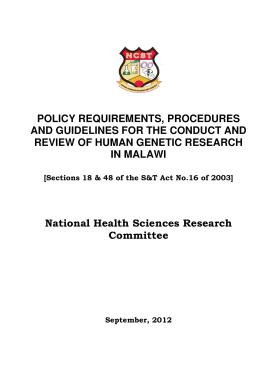Human Genetic Research Procedures and Guidelines
Human Genetic Research Procedures and Guidelines
The benefits of human genetics research in promoting the health of mankind cannot be over-emphasised. For example, genetics research enhances the understanding of how genes and environmental factors interact to influence the health of individuals and communities. Gene localization and identification studies would be helpful in identifying genes in individuals or communities that cause or contribute to a disease/disorder or a trait. These types of studies including genetic screening and diagnostic studies have both the public health and therapeutic advantages to the participating individuals and communities. Thus, research in genetics has the potential to generate scientific knowledge that could improve the health of individuals and communities.
However, research in human genetics is internationally recognized as an area in biomedical research that poses greater concern for ethical, political, religious and cultural sensitivities and controversies than any other area in biomedical research involving humans. While genetic science and technology offers some benefits, it also has potential for risks of various harms not only for the individuals or communities that are participating in a genetic study but also families, populations and a country as a whole. Ethically and politically, genetic information (more than any other health information) could have harmful social consequences for individuals and countries when used in contexts such as employment, insurance and immigration. For example, cases have been reported of people with asymptomatic genetic predisposition who were excluded from employment or insurance and denied immigration status (Emanuel, EJ et al., 2003). Other risks of harm associated with genetics research include potential for stigmatisation and discrimination of certain individuals, families, tribes and societies besides psychosocial impacts all arising from use and careless disclosure of genetic information. As genetic research also involves family members, some family members may prefer not to be given genetic information that might provide knowledge of future health or health risks. In addition, other family members who are not blood relatives, such as partners and spouses, may have an interest in the genetic information because of concerns about the health of the offspring. While potential risks of harm arising from genetic research could be several, the Government of Malawi does not prohibit the conduct of genetic research but requires concerned researchers and stakeholders to not only clearly articulate sound rationale/justification for the conduct of such studies but also to properly define steps and strategies of how they would obviate the risks of harm. It is important to note that Government of Malawi through “The Government Policy Measures for the Improvement of Health Research Co-ordination in Malawi (2005)” designated genetics research as one of the areas under studies of national interest because of the greater magnitude of the ethical, safety and political implications associated with such studies.

